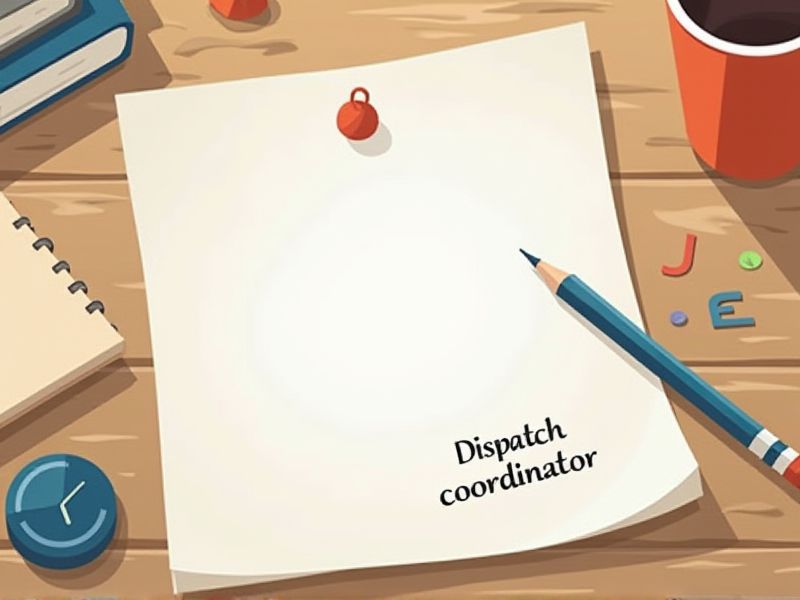
A Dispatch Coordinator plays a crucial role in ensuring that resources are allocated efficiently, which demands a specialized skill set. Certifications provide structured training, enhancing the ability of coordinators to manage logistics effectively and respond to unexpected challenges. Employers often seek candidates with recognized credentials to ensure that industry standards and protocols are met consistently. Here are some important certifications you may need for a Dispatch Coordinator role.
Certified Transportation Professional (CTP)
A Certified Transportation Professional (CTP) brings industry-recognized expertise, enhancing the credibility and performance of a dispatch coordinator. Their in-depth knowledge of logistics and regulatory compliance ensures efficient and lawful transportation operations. Having a CTP certification often leads to improved decision-making capabilities, resulting in optimized routes and reduced operational costs. Companies that employ dispatch coordinators with CTP certification tend to experience improved service reliability and customer satisfaction rates.
Certified in Logistics, Transportation and Distribution (CLTD)
Obtaining a CLTD certification equips a dispatch coordinator with a comprehensive understanding of global logistics operations, enhancing their capacity to optimize transport routes efficiently. This certification imparts essential skills in inventory and warehouse management, which are crucial for coordinating dispatch operations effectively. CLTD training also provides insights into regulatory compliance, ensuring that coordinators can avoid costly legal mishaps while managing transportation and distribution. Knowledge gained through CLTD fosters better communication with stakeholders, streamlining operations and facilitating smoother logistical processes.
Certified Supply Chain Professional (CSCP)
A Dispatch Coordinator's role often involves complex supply chain operations, and obtaining a Certified Supply Chain Professional (CSCP) designation provides the essential knowledge to streamline these processes. The CSCP certification equips professionals with advanced skills in logistics and inventory management, which can directly enhance a Dispatch Coordinator's ability to optimize shipment scheduling and routing. Certified professionals are often more adept at identifying potential inefficiencies within the supply chain, leading to improved operational performance and cost reductions. Employers value the CSCP credential as it signifies a comprehensive understanding of end-to-end supply chain processes, increasing the credibility and potential career advancement of Dispatch Coordinators.
APICS Certified in Production and Inventory Management (CPIM)
A Dispatch Coordinator with APICS CPIM certification gains a better understanding of production and inventory control systems, improving operational efficiency. This certification equips them with skills in demand management and planning, essential for effective resource allocation. CPIM knowledge enhances their ability to integrate supply chain components, ensuring timely and accurate dispatch operations. Companies often prefer hiring certified professionals to minimize errors and streamline logistics processes.
Lean Six Sigma Green Belt
A Lean Six Sigma Green Belt equips a Dispatch Coordinator with skills in process improvement, leading to increased efficiency in managing logistics and scheduling. With a structured approach to identifying and eliminating waste, they help reduce operational costs. Utilizing data-driven decision making enhances the accuracy and reliability of deliveries. Problem-solving expertise fosters a more responsive and agile dispatch operation, improving customer satisfaction.
Project Management Professional (PMP)
Having a PMP certification enhances a dispatch coordinator's ability to efficiently manage logistics and resources, thereby reducing delays and errors in dispatch processes. Effective project management principles help in forecasting demand and capacity, thus enabling better planning and scheduling of dispatch operations. PMP knowledge equips dispatch coordinators with tools for risk management, minimizing potential disruptions in supply chain activities. Certified professionals often bring improved communication skills, facilitating smoother collaboration between teams and external vendors.
Certified Logistics Associate (CLA)
A Certified Logistics Associate (CLA) designation equips a dispatch coordinator with essential knowledge in supply chain logistics, ensuring efficient coordination of shipments. The certification provides foundational skills in product storage and distribution, which can enhance the dispatcher's ability to manage inventory accurately. Possession of a CLA credential often increases trust among employers and clients, leading to more effective communication and partnerships. This qualification frequently leads to improved problem-solving capabilities in logistics operations, reducing errors and delays in dispatching responsibilities.
Hazardous Materials Transportation Certification
Hazardous Materials Transportation Certification is crucial for a Dispatch Coordinator as it ensures they understand the specific regulations and safety protocols required to handle dangerous goods. Proper certification minimizes the risk of accidents and environmental damage by equipping coordinators with the knowledge necessary to comply with legal standards. This certification enhances communication efficiency between drivers, regulatory bodies, and dispatch teams to mitigate delays and align with safety procedures. Moreover, certified coordinators can effectively manage crisis situations, maintaining the integrity of supply chains and protecting public safety.
NAFA Fleet Management Certification
Gaining NAFA Fleet Management Certification provides a Dispatch Coordinator with a comprehensive understanding of fleet operations, which directly enhances decision-making abilities. This certification often leads to increased efficiency in managing vehicle logistics and reduces the risk of operational disruptions. Possession of this certification signals to employers a commitment to industry standards and professional development, often leading to career advancement opportunities. The expertise acquired through NAFA's program contributes significantly to cost controls in fleet management by fostering more strategic asset utilization.
Customer Service Excellence Certification
Obtaining a Customer Service Excellence Certification can enhance a dispatch coordinator's skills in handling and resolving queries efficiently, leading to improved customer satisfaction. The certification provides advanced training in communication techniques, crucial for coordinating with multiple stakeholders in a fast-paced environment. Mastery of customer service principles can empower dispatch coordinators to make informed decisions during critical situations, reducing errors and delays. This certification may also give dispatch coordinators a competitive edge, potentially leading to career advancement or increased job security.
Summary
By obtaining certifications, you enhance your professional credibility, positioning yourself as a more valuable asset within the logistics industry. The certification often leads to increased job opportunities and potential salary increments, reflecting industry recognition of your expertise. Your improved skill set contributes to more efficient dispatch operations, reducing errors and delays. As a certified professional, you also gain access to a network of industry experts, fostering continuous learning and collaboration.
